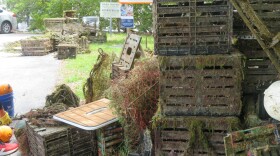-
According to a new study and hundreds of videos shot mostly in waters near Palm Beach County, manta rays can act as a mobile home, providing food, shelter, even honeymoon suites for fish in sometimes inhospitable waters.
-
The stowaways were discovered hanging out in a leafy park on one of the world’s largest cruise ships after it left PortMiami earlier this year on a trip bound for Spain. Why the pint-sized birds that normally favor solid ground wound up sailing the high seas remains a mystery.
-
What started as a favor to help find a friend's missing cat became a full-time job for Jamie Katz, who has spent the past decade tracking lost pets across South Florida. Now, she's using her skills to help protect bears in Florida.
-
Neurotoxin levels were highest in the dolphins stranded during warmer months, when harmful algal blooms are more severe.
-
A dozen boat teams and even more shoreline volunteers participated in the latest Derelict Trap Rodeo, part of Friends of Biscayne Bay's efforts to restore the bay. WLRN rode along with one team as they removed abandoned crab and lobster traps that continue to trap and harm marine life long after they’re left behind.
-
People who abuse and abandon animals will face more penalties in Florida under a new law. They'll also be put on a public database.
-
The Florida burrowing owl is a threatened species. Conservationists, students and faculty think Florida Atlantic University should be doing more to protect their beloved mascot.
-
Gulf sturgeon face increasing human-made challenges. Pollution has expanded in the Suwannee River in north Florida and climate change is contributing to swings between high and low water levels. Florida’s prehistoric fish are surviving as they have for eons, scientists say. But they’re not invincible.
-
In a report Tuesday, the Florida Keys Wildlife Research Institute said no new sawfish deaths have been reported since June. But exactly what caused the startling behavior remains unknown.
-
Genetic testing will help Florida ranchers select and breed cattle that better tolerate the heat.
-
Scientists believe modern flamingos, which state wildlife officials do not believe are native, are reclaiming their historic range and want the birds reclassified. A new Audubon count has raised their optimism.
-
Broward County Animal Care aims to educate the community on cat-trapping with help from former rap artist Sterling "TrapKing" Davis.
Play Live Radio
Next Up:
0:00
0:00
Available On Air Stations











